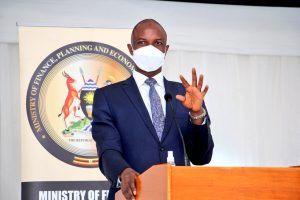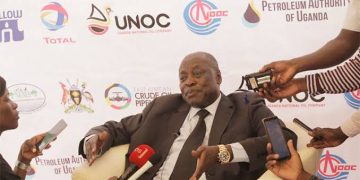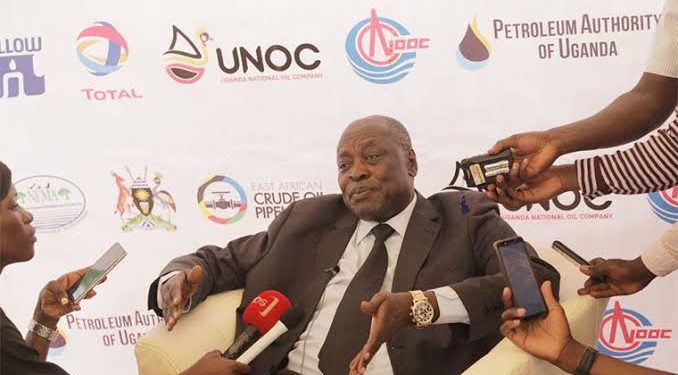Government has revealed that 25% of the contracts in the Oil and Gas sector have been awarded to local companies since the signing of the Final Investment Decision in February 2022.
On February 1, French energy conglomerate Total Energies and the China National Offshore Oil Corporation – CNOOC reached a deal with Uganda and Tanzania to invest more than US$10 billion in developing crude oil production between the two East African countries.
Speaking to reporters at the Uganda Media Center, Peter Lokeris, the state minister for Minerals in the Ministry of Energy and Mineral Development noted that TotalEnergies and CNOOC (U) Ltd through the established tendering processes, have awarded contracts totaling about US$6.8 billion, of which an estimated US$ 1.73 Billion (25%) have been awarded to Ugandan companies.
Lokeris also revealed that Ugandans are already reaping benefits from the progress of the oil activities with 160,000 people expected to be employed at the peak of activities.
According to the minister, 5,000 people are currently employed in the sector, of which, 94% are Ugandans.
In addition, he said international development partners such as the World Bank are supporting targeted skilling and infrastructure developments where oil and gas activities are taking place to enable the citizens and communities maximally benefit from the sector’s activities.
Mr Ernest Rubondo, the executive director of the Petroleum Authority of Uganda (PAU), also revealed that the sector has started experiencing increase in activities.
Giving insights about the oil and gas investment advancement, Rubondo revealed that investment in the sector grew from USD 180 Million in 2020 to USD 500 Million in 2021 and is projected to grow to USD 3 Billion this year (2022).
He asked Ugandan companies to do joint ventures with foreign companies to increase the value in the country’s economy and knowledge/ skills transfer.
Mr. Rubondo said, “benefits from oil and gas sector can be increased from the revenues which are to be generated, and the participation of Ugandans (in National Content) and the linkages between oil and other sectors of the economy such as agriculture, education, housing, among others.”
For companies to operate in the Oil and Gas Sector, they must be Register on the National Suppliers’ Database.
By April 2021, 2,151 companies had been registered of which over 1600 are Ugandan while 551 are foreign based.
Currently, major works are in three areas; Tilenga project, King Fisher project and the East African Crude Oil Pipeline (EACOP) project .

The Permanent Secretary in the Ministry of Finance, Ramathan Ggoobi, was quoted by the PAU saying, “According to the Authority’s Upstream Benefits Report for the period 2017 to 2019, the direct benefits to Government in form of Tax revenues was UGX 212.7 Billion and Non Tax-Revenue (NTR) was UGX 22.1 Billion, while the indirect benefits to Ugandan nationals was realized in form of; procurement of local produced goods and services UGX 161.2 Billion, employment of 247 Ugandans earning salaries amounting to UGX 85.6 billion, Training of Ugandan Nationals in the private sector, Government and in the Oil Companies costing UGX 12.9 billion and, corporate social responsibility engagements costing UGX 0.76 billion.”
He added: “The total expenditures by the international oil companies in Uganda during the period 2017 to 2019 was well above UGX 495.2 billion.”
On the impact, Minister Lokeris said the EACOP in Uganda affected 3,648 PAPs of which 2,662 have already signed compensation agreements and 1,977 fully paid.
He said the project is also constructing 183 replacement houses for the PAPs who opted for physical resettlement.
He revealed that the compensation process is progressing well, and no land has been acquired before fair and adequate compensation payment.
Lokeris added that Uganda’s oil and gas journey is progressing well, and the sector is expected to significantly contribute to the country’s socio-economic transformation and overall development.
Recently there was uncertainty on Uganda’s Oil development following a resolution by the EU Parliament.
On September 15, the European Parliament passed an “emergency resolution” by a large majority denouncing the consequences of Uganda’s oil projects— specifically Tilenga and the East African Crude Oil Pipeline (EACOP).
The EU Parliament called for halting of drilling activities in the protected and sensitive ecosystem (Murchison Falls National Park) and postponement of work on the EACOP for at least one year to study the feasibility of an alternative route that would preserve the environment and consider other projects based on renewable energy.
The MPs also called for an end to human rights violations, including the immediate release of human rights defenders arrested in an arbitrary manner.
However, Lokeris said the oil projects have been designed to technologically generate the lowest possible carbon footprint. Overall, the projects fall within the category of “low emission”.
“The carbon dioxide equivalent (C02e) emission per barrel for Uganda’s upstream and midstream projects is estimated to be 20-45 kgC02e. This is well below the global average of 70-100 kgC02e,” he said.
Uganda’s recoverable oil resources are currently estimated at 1.4 billion barrels.
Assuming an average of 30 kgC02e per barrel, the total emissions are estimated at 42 mTC02e over the production period of 25 years which is an average of 1.68mT per year (not 34mT as stated in the resolution).
More so, 80% of Uganda’s energy is from renewable sources such as hydro-power, solar and biomass.
The country has been promoting other clean energy initiatives with many development partners, including the Deutsche Gesellschaft fiir Internationale Zusammenarbeit GmbH (GIZ).
Promoting and manufacturing zero-emission vehicles (EVs) by Kiira Motors Corporation, a State-owned car manufacturer, is among the key priorities Government is curbing emissions of greenhouse gases.









